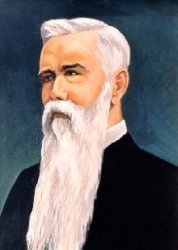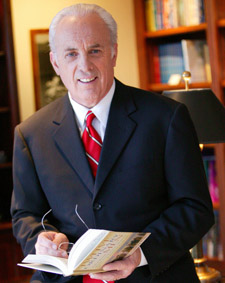Providence is an effective, all-comprehensive, divine agency that touches every event in the physical and spiritual world. Many of God’s saints, in the hardest and darkest times of their lives, have had peace by their understanding of and faith in the Lord’s providential care. The Lord God omnipotent reigns! B.H. Carroll (1843-1914) explains further:
The providence of God is not only preventive and permissive of evil but is also directive. What do I mean by directive? I mean that God so directs evil actions as to disappoint the purpose and expectation of the sinner and his tempter. Let us get that very clear. Two scriptures will serve to show that God’s providence is directive with reference to the actions of evil men when it so operates that this evil action shall miss its issue, shall come to another issue neither intended nor desired by the perpetrator.
The first scripture is from the book of Genesis. The wicked brothers of Joseph, who had sold him into Egypt, are now in trouble in that very land. Their consciences accuse them:
“And they said one to another, We are verily guilty concerning our brother,in that we saw the anguish of his soul, when he besought us and we would not hear; therefore is this distress come upon us. And Reuben answered them, saying, Spake I not unto you, saying, Do not sin against the child; and ye would not hear? Therefore, behold, also his blood is required.” (Genesis 42:21, 22.)
This was the human side. On the other hand, hear Joseph: “I am Joseph, your brother, whom ye sold into Egypt. Now, therefore, be not grieved nor angry with yourselves that ye sold me hither; for God did send me before you to preserve life *** to preserve you a posterity in the earth and to save your lives by a great deliverance. So now, it was not you that sent me hither, but God.” That is, you meant evil. God directed that action so as to change it into an issue that was not foreseen nor purposed by you. The other scripture is from the fourth chapter of Acts. These two will answer for a thousand. They equal in importance any in the Bible:
“And when they heard that, they lifted up their voice to God with one accord, and said, Lord, Thou art God, which hast made heaven and earth, and the sea, and all that in them is: Who by the mouth of Thy servant David hast said, Why did the heathen rage, and the people imagine vain things? The kings of the earth stood up, and the rulers were gathered together against the Lord, and against His Christ. For of a truth against Thy holy child Jesus, whom Thou has anointed, both Herod, and Pontius Pilate, with the Gentiles, and the people of Israel, were gathered together, for to do whatsoever Thy hand and Thy counsel determined before to be done.” (Acts 4:24-28.)
Now here was an entirely independent purpose and expectation on the part of Herod, on the part of Pilate, on the part of the Jews. They meant death and ruin and yet God’s providence governed their very malice to an issue neither foreseen, desired nor purposed by them, in that it accomplished not only His own predetermined purpose, working not for the ruin but for the salvation of the world.
Yet another term may be employed to show how the providence of God touches evil actions, to-wit, determinative. Terminus means a boundary, a limit, and to determinate is to set a boundary. The providence of God then touches evil actions by putting a limit upon them. An illustrative case or two may be rapidly stated. The devil wanted to get hold of Job, to worry and destroy him. He asked the Lord for an opportunity. God, having purposes of His own to accomplish concerning Job and others, gave the permission but set a limit at Job’s life: “You may take his cows; you may take his camels; you may take his children so far as their earthly health and existence is concerned; you may touch Job himself and cover his body with loathsome ulcers, but the life of Job, the soul of Job, the spiritual standing of Job in the sight of God, oh, devil, you cannot touch.” There God puts an impassable barrier.
In the same direction are the words of the Psalmist:
“If it had not been the Lord who was on our side, now may Israel say: If it had not been the Lord who was on our side, when men rose up against us, then they had swallowed us up quick, when their wrath was kindled against us: then the waters had overwhelmed us, the stream had gone over our soul; then the proud waters had gone over our soul; blessed be the Lord, who hath not given us as a prey to their teeth. Our soul is escaped as a bird out of the snare of the fowlers; the snare is broken, and we are escaped. . . .” (Psalm 124:1-7)
Leave out the determinative providence of God, that feature of God’s providence that sets a limit to the wrath of evil men and the devil, and the foundation would be removed, and then what could the righteous do?
 Tacitus, the Greatest Roman historian, was born 52 A.D. He wrote a history of the reign of Nero in 110 A.D. In it he said “…Christus [Christ], from whom they got their name, had been executed by sentence of the procurator Pontius Pilate when Tiberias was emperor; and the pernicious superstition was checked for a short time only to break out afresh, not only in Judea, the home of the plague, but in Rome itself, .. ” (Annals 15:44)
Tacitus, the Greatest Roman historian, was born 52 A.D. He wrote a history of the reign of Nero in 110 A.D. In it he said “…Christus [Christ], from whom they got their name, had been executed by sentence of the procurator Pontius Pilate when Tiberias was emperor; and the pernicious superstition was checked for a short time only to break out afresh, not only in Judea, the home of the plague, but in Rome itself, .. ” (Annals 15:44)


































 Archaeology and the Bible:
Archaeology and the Bible:
























